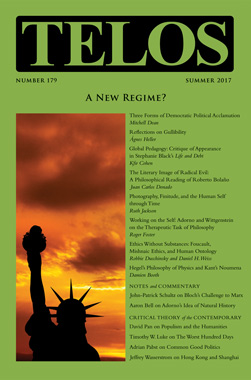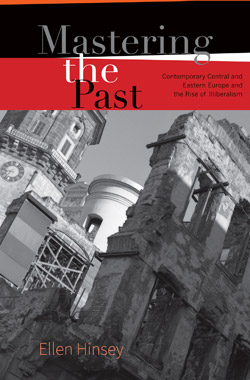By Ellen Hinsey · Thursday, July 13, 2017 In the wake of the Brexit vote and the 2016 American presidential election, the idea began to circulate that we were witnessing a trans-Atlantic, populist “revolt against the elites,” which had spontaneously arisen from populations whose concerns had, for too long, gone unheard by those in power. Longstanding economic problems regarding income disparity and wealth—left unaddressed by both sides of the political spectrum—are indeed among the most pressing issues that we currently face. But as has been observed, the first half-year of the new U.S. presidential administration, with one of the wealthiest cabinets in American history, calls into question the validity of the “populist” interpretation in the U.S. context. The failure of this theory has in turn exposed a gap in our ability to conceptualize what actually happened during the U.S. election, what is unfolding before us, and how we got here.
Continue reading →
By Mitchell Dean · Wednesday, July 12, 2017 This paper takes its initial inspiration from Carl Schmitt’s claim in 1927 that the “original democratic phenomenon . . . is acclamation,” and draws upon the interchange between religious and political forms of acclamation observed by Ernst Hartwig Kantorowicz and Erik Peterson and elaborated recently by Giorgio Agamben. If Schmitt is correct, then acclamation is central to the construction of “the people” who by definition are the source of political legitimacy. What is required then is what I have called an “analytics of publicity” that would study the different ways in which the public is formed through different forms of acclamation.
Continue reading →
By Russell A. Berman · Monday, June 12, 2017 Telos 179 (Summer 2017) is now available for purchase in our store.
 When the historian Ken Burns spoke at the Stanford University commencement last June, he delivered an exceptionally political address, including an attack on what he labeled the “Vichy Republicans.” Those Republican leaders who had not distanced themselves from candidate Trump, so Burns, were the equivalent of the Vichy French who collaborated with Hitler. That master metaphor, comparing 2016 to 1933, has continued into the new administration, with the anti-Trump camp labeling itself as “the resistance.” Despite Burns’s historiographical authority, one might question the validity of the underlying equation. No doubt the policies of the Trump administration are more conservative than those of Obama—hardly surprising—but the paradigms of the totalitarianism of the twentieth century are not necessarily the most adequate theoretical tools to analyze early twenty-first-century political phenomena. As emotionally satisfying as it may be for some to try to relive battles of earlier decades, Critical Theory ought to try to do better. We may very well be entering a different political era, a new regime, and not only in the United States. Can we describe it more effectively? When the historian Ken Burns spoke at the Stanford University commencement last June, he delivered an exceptionally political address, including an attack on what he labeled the “Vichy Republicans.” Those Republican leaders who had not distanced themselves from candidate Trump, so Burns, were the equivalent of the Vichy French who collaborated with Hitler. That master metaphor, comparing 2016 to 1933, has continued into the new administration, with the anti-Trump camp labeling itself as “the resistance.” Despite Burns’s historiographical authority, one might question the validity of the underlying equation. No doubt the policies of the Trump administration are more conservative than those of Obama—hardly surprising—but the paradigms of the totalitarianism of the twentieth century are not necessarily the most adequate theoretical tools to analyze early twenty-first-century political phenomena. As emotionally satisfying as it may be for some to try to relive battles of earlier decades, Critical Theory ought to try to do better. We may very well be entering a different political era, a new regime, and not only in the United States. Can we describe it more effectively?
Continue reading →
By Timothy W. Luke · Thursday, May 11, 2017 Assessing asymmetric wars in the abstract is a problematic task, even though most are “small wars” fought by “big nations.” Armed conflicts with these characteristics brim with persistent, undeclared, and low-intensity violence. It rarely is extinguished, and the lingering injuries sustain even more violence on the same scale. Many of these small wars began in Asia, Africa, Latin America, or the Middle East during, or not long after, World War II. Armed resistance there never completely ended; instead it intensified with decolonization and/or postcolonial state failure. Now virtually institutionalized in many violent wild zones around the world, low-intensity wars also flare up as asymmetric conflicts between rich countries and poor peoples, Westernized nations and anti-Western movements, liberal democratic states and illiberal theocratic insurgents after 1989.
Continue reading →
By Telos Press · Wednesday, March 1, 2017 New from Telos Press: Ellen Hinsey’s Mastering the Past: Contemporary Central and Eastern Europe and the Rise of Illiberalism. Order your copy in our online store, and save 20% on the list price by using the coupon code BOOKS20 during the checkout process.
 Over the last decade Ellen Hinsey has traveled across Central and Eastern Europe researching a critical shift in the European political landscape: the rise of illiberalism. A quarter of a century after the changes of 1989—and as former Soviet sphere societies come to terms with their histories—the specters of populism, nationalism, extreme-right parties, and authoritarian rule have returned in force. Through a series of eyewitness reports, Mastering the Past offers an insider’s view of key political events, including the 2012 Russian elections, the Polish presidential plane crash in Smolensk, and Prime Minister Viktor Orbán’s vision for a new Hungary. Hinsey explores the darkening hour of European politics with an incisive mind and an eye for detail, recording the urgent danger that illiberalism represents for the new century. Over the last decade Ellen Hinsey has traveled across Central and Eastern Europe researching a critical shift in the European political landscape: the rise of illiberalism. A quarter of a century after the changes of 1989—and as former Soviet sphere societies come to terms with their histories—the specters of populism, nationalism, extreme-right parties, and authoritarian rule have returned in force. Through a series of eyewitness reports, Mastering the Past offers an insider’s view of key political events, including the 2012 Russian elections, the Polish presidential plane crash in Smolensk, and Prime Minister Viktor Orbán’s vision for a new Hungary. Hinsey explores the darkening hour of European politics with an incisive mind and an eye for detail, recording the urgent danger that illiberalism represents for the new century.
Continue reading →
By Telos Press · Monday, February 13, 2017 Mastering the Past:
Contemporary Central and Eastern Europe and the Rise of Illiberalism
by Ellen Hinsey
 Over the last decade Ellen Hinsey has traveled across Central and Eastern Europe researching a critical shift in the European political landscape: the rise of illiberalism. A quarter of a century after the changes of 1989—and as former Soviet sphere societies come to terms with their histories—the specters of populism, nationalism, extreme-right parties, and authoritarian rule have returned in force. Through a series of eyewitness reports, Mastering the Past offers an insider’s view of key political events, including the 2012 Russian elections, the Polish presidential plane crash in Smolensk, and Prime Minister Viktor Orbán’s vision for a new Hungary. Hinsey explores the darkening hour of European politics with an incisive mind and an eye for detail, recording the urgent danger that illiberalism represents for the new century. Over the last decade Ellen Hinsey has traveled across Central and Eastern Europe researching a critical shift in the European political landscape: the rise of illiberalism. A quarter of a century after the changes of 1989—and as former Soviet sphere societies come to terms with their histories—the specters of populism, nationalism, extreme-right parties, and authoritarian rule have returned in force. Through a series of eyewitness reports, Mastering the Past offers an insider’s view of key political events, including the 2012 Russian elections, the Polish presidential plane crash in Smolensk, and Prime Minister Viktor Orbán’s vision for a new Hungary. Hinsey explores the darkening hour of European politics with an incisive mind and an eye for detail, recording the urgent danger that illiberalism represents for the new century.
Continue reading →
|
|




